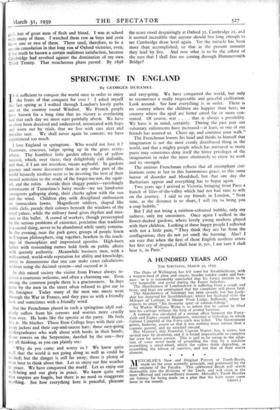SPRINGTIME IN ENGLAND
By GEORGES DUHAMEL
Iit sufficient to conquer the world once in order to enjoy 1 the fruits of that conquest for ever ? I asked myself this last spring as I walked through London's lovely parks and in the country round Windsor. We French people have known for a long time that no victory is everlasting and that each day we must start painfully afresh. We have so often been deceived and undeceived, intoxicated with hope and worn out by trials, that we live with ears alert and muscles taut. We shall never again be content; we have experienced too much.
I love England in springtime. Who would not love it ? Primroses, crocuses, tulips spring up in the grass every- where. The humblest little garden offers tufts of yellow narcissi, which, over there, they delightfully call daffodils, and that, if I am not mistaken, means asphodel. In gardens greener and more decorative. than in any other part of the world leisurely strollers seem to be devoting the best of their mental activities to the study of the forget-me-not, the squir- rel, and the robin. Astride their shaggy ponies—ravishingly reminiscent of Tamerlane's hairy steeds—we see handsome youngsters galloping along, their cheeks aglow with the sun and the wind. Children play with disciplined enthusiasm on immaculate lawns. Magnificent soldiers, shaped like treble clefs, parade their colours beneath the windows of the royal palace, while the military band gives rhythm and mea- sure to this ballet. A crowd of workers, though preoccupied by the serious problems of existence, proclaims that tradition is a sacred thing, never to be abandoned while sanity remains. In the evening, near the park gates, groups of people listen to Utopian philosophers, sing together, hearken to the teach- ings of theosophists and improvised apostles. High-born ladies with resounding names hold forth on public affairs with queenly authority. Meanwhile business men, with a well-earned, world-wide reputation for ability and knowledge, strive to demonstrate that one can make exact calculations without using the decimal system—and succeed at it.
In this mixed society the visitor from France always re- ceives a courteous welcome, and often a charming one. Even among the common people there is a graciousness. In days gone by the men in the street often refused to give ear to the foreigner. Today many of the men one meets went through the War in France, and they pass us with a friendly look and sometimes with a friendly word.
But the Frenchman placed in such a springtime idyll sud- denly suffers from his sorrows and worries more cruelly than ever. He looks like the spectre at the party. He feels like it. He blushes. Those Eton College boys with their cut- away jackets and their cup-and-saucer hats; those easy-going undergraduates who walk about with books in their hands; those rowers on the Serpentine, dazzled by the sun—they are all thinking, as you can plainly see : " Why do you come and worry us ? We know quite well that the world is not going along as well as could be swished; but the danger is still far away; there is plenty of time later to think about that. Let us enjoy our fine weather in peace. We have conquered the world. Let us enjoy our wa-being and our glory in peace. We know quite well that empires are fragile, but there is no need to exaggerate anything. See how everything here is peaceful, pleasant and easy-going. We have conquered the world, but only to reconstruct a really respectable and graceful civilisation. Look around. See how everything is in order. There is no country where the children are happier than here; no country where the aged are better cared for or more con- tented. Of course, war . . . . that is always a possibility. We have it in mind, certainly. During the past year our voluntary enlistments have increased—at least, so one of our friends has assured us. Cheer up, and continue your walk."
The Frenchman lowers his head and thinks to himself that imagination is not the most evenly distributed thing in the world, and that a mighty people which has nurtured so many poets may sometimes deny itself the bitter privileges of the imagination in order the more obstinately to enjoy its work and its strength.
The anxious Frenchman reflects that all triumphant civi- lisations come at last to this harmonious grace, to this same horror of disorder and bloodshed, but that one day the Barbarians appear and everything has to begin again.
Two years ago I arrived at Victoria, bringing from Paris a bunch of lilies-of-the-valley which had not had time to wilt on the journey. I said to my friends in London, " Next time, as the distance is so short, I will try to bring you a soap bubble."
But I did not bring a rainbow-coloured bubble, only my sadness, only my uneasiness. Once again I walked in the flower-decked gardens, where lovely young mothers played with their children. Looking at these happy people I reflected with not a little pain, " They think they are far from the conflagration; they do not yet smell the burning. Alas I I am sure that when the first of these English mothers utters her first cry of despair, I shall hear it, yes, I am sure I shall hear it, in Paris."


































































 Previous page
Previous page